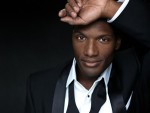Column Name
Title
Mezzo-soprano Carolyn Sebron (B.M. ’81, M.M. ’83, voice) met tenor Noah Stewart (B.M. ’01, voice) by chance at a Columbus Circle café; she overheard the tenor and his friends talking about Porgy and Bess and Carmen, and she and Stewart soon discovered that they were both Juilliard-trained singers. Intrigued, she subsequently interviewed him.
Body
Noah Stewart grew up in New York City, and while he was attending LaGuardia High School of Performing Arts, he sang backup for Mariah Carey, Hootie and the Blowfish, and Coolio and also did voiceovers for Sesame Street and other TV shows. Devoting himself to opera after Juilliard, Stewart was an apprentice in San Francisco’s Merola Opera Program in 2006 and a 2007 Adler fellow with the San Francisco Opera; he joined the Metropolitan Opera’s roster in 2008. Among Stewart’s recent roles are Romeo in Knoxville Opera’s production of Gounod’s Romeo and Juliet in February and, in March, Hassan in Covent Garden’s premiere of Judith Weir’s Miss Fortune.
Had you always dreamed of being a singer?
I went to P.S. 87 and then I.S. 44 on the Upper West Side, and I wanted to become a scientist. I was sitting in junior high and an announcement came on the speaker: “choir rehearsal after school.” I needed to do something [after school] because my mom worked, so I auditioned for choir. They took me, because they needed male voices, and I connected with the music right away. It took me away.
You also had an attraction to the stage?
That also started in elementary school, when I was in a school play and found I liked being up there; I liked playing and being different characters. We did Broadway music and I knew I wanted to be an actor. Fast forward to junior high, when our music teacher took us to a competition at the New England Music Festival. I came in first in the eighth-grade solo voice competition, and won a trophy. It was the first thing I’d ever won, and I still have it today. I then got in to LaGuardia, where we had opera workshop, and I was really hooked. And after high school I was accepted to Juilliard on a full scholarship.
How was Juilliard?
Juilliard was a lesson. It was a new experience being around the best of the best all the time. It taught me how to dig deep and stay in the game, and also how to deal with everything after I graduated. I knew if I was going to make it, I had to work to pay for lessons, etc., and I took some time off—temping, working in restaurants, working at Carnegie Hall, and catering—I had four résumés. There is nothing like doing it for yourself: it teaches you discipline. That’s not to say there was no one there for me. There were many “angels” who inspired and helped me along the way including Leontyne Price, Barbara Conrad, and Igor Chichagov, who taught me for free, and many others.
What was your breakthrough moment?
In 2007, I was understudying the main tenor role of Macduff [in Verdi’s Macbeth] while singing Malcolm, a smaller role. I decided to learn the Macduff through and through although I was told my chances of going on were next to none. At the last performance, the tenor got sick after Act I, and when they asked me if I knew the role, I said yes—and I went on stage and nailed it. That changed everything for me. I was able to use that as a springboard for my career. I got management, and little by little, things started to come in.
Last year you sang Don José in Opera Africa’s Carmen, which was your first time in South Africa. What was your first impression?
“Oh my God, I’m finally here!” I was there for seven-and-a-half weeks for rehearsals and 10 performances of Carmen with an all-black cast. We performed in the state theater in Pretoria, and it was a huge working company, a very modern facility. I also worked with the studio members, taught master classes and lessons, and did some outreach in the community. On one occasion, we did a program, in costume, at a local mall. As soon as we started singing, a group of little kids, 5 to 7 years of age, sat down with their lunches at the edge of the stage. They got very quiet and their faces lit up.
Eleven years out of Juilliard and into your career, what do you think makes a great artist?
An artist always wants to get better, they never stop learning. [Beniamino] Gigli said, “If I stop learning, I will die.” For me, I feel like I’m here for a reason. I do have “aha moments.” I feel like an ambassador. And I feel the burden to continue. God has put this gift in my throat. It’s such a great thing to be a singer.
Where would you like to be in five years?
I was inspired by Luciano Pavarotti, who made opera more accessible with his Pavarotti and Friends charity concerts: I want to be an ambassador for music. I would like to be singing in most of the major opera houses, but I see myself as being in the circle of classical music reaching out to other types of audiences. I want to start a school to help musicians of color. I want to start giving back, to be a mentor, to speak to young artists.





